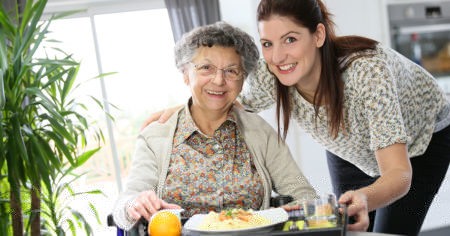
People living with dementia generally do not need to follow a special diet, unless they have co-morbidities or allergies that have certain requirements. However, since dementia is a progressive condition, care providers will need to become increasingly more involved in food preparation and serving relative to the person’s status of decline.
By mid-stage, dementia may cause a person to forget to eat or leave them confused about how to use appliances for food preparation. Even under assisted living or full-time care, a person with dementia needs special attention to mealtimes in order to maintain proper nutrition.
Vision problems. As we age, we naturally experience a narrowing of our field of vision. For a person living with dementia, this process is on overdrive and it may cause them to not see a plate of food in front of them unless they are directly looking at it. Additionally, the ability to detect color and contrast becomes impaired; the person may have trouble, for example, seeing shouldn’t rush meal consumption, it’s important to redirect focus onto the task at hand.
Too much activity like eating in a group dining hall, eating with young children at the table, or having excessive background noise may make mealtime more stressful. That said, there’s no harm in friends and family joining at the dinner table if it contributes to a positive experience.
Keeping the table set minimally will help keep the person’s focus on their meal. Provide a pre-served plate rather than bringing family-style platters of food items for serving at the table.
Hydration concerns. Those living with dementia are more susceptible to becoming dehydrated, as they commonly experience a declining ability to sense thirst. Care providers can help increase water intake in a couple ways: First, encourage drinking by offering a variety of beverages such as decaf hot or iced tea and water flavored naturally with fruit. Offer water-dense foods like pineapple, melons, cucumber, and tomatoes to sneak in additional hydration.
You might also like: